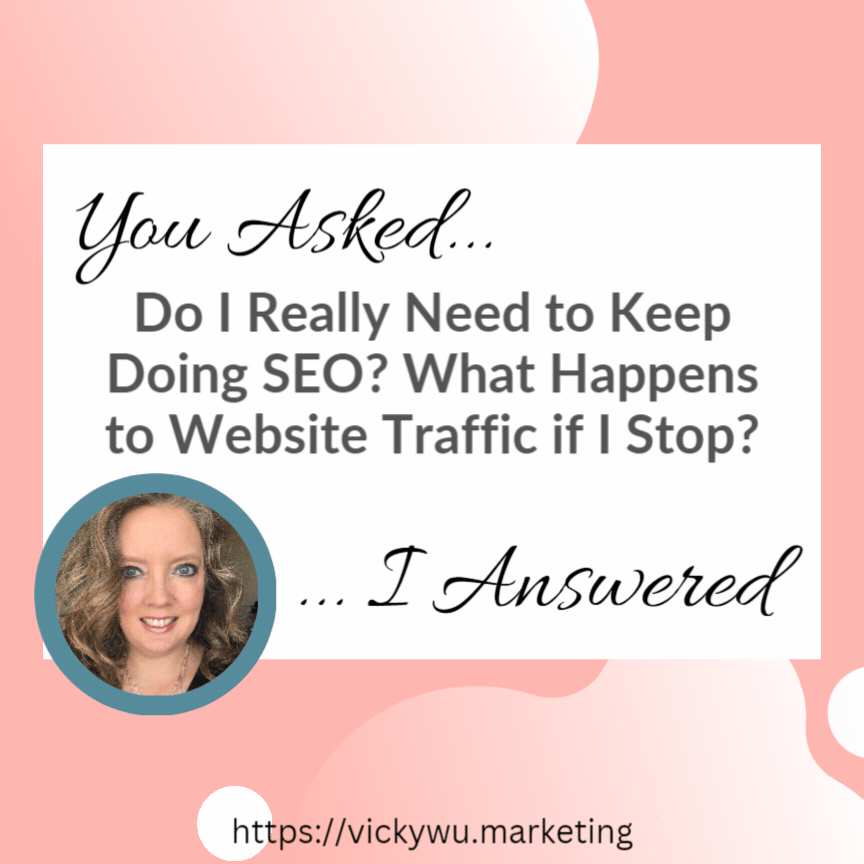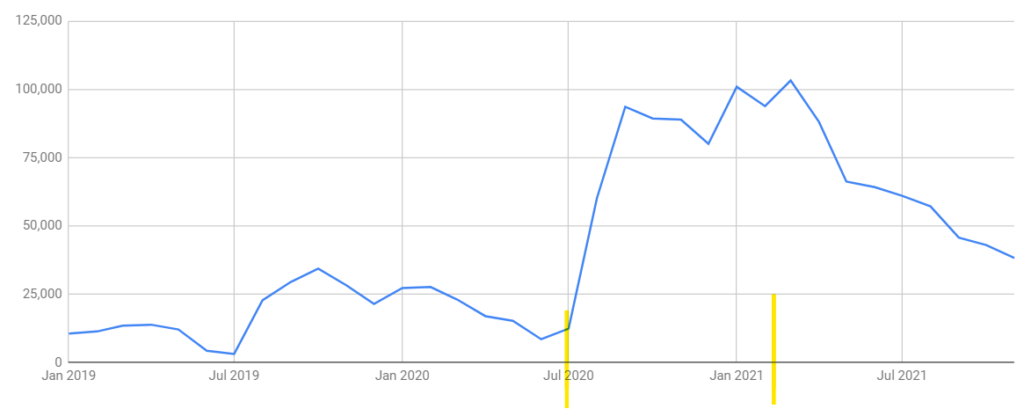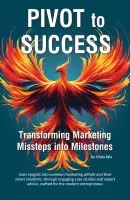- +1 512-591-8295
- [email protected]
- Mon - Fri: 9:00 - 16:00

How can I estimate traffic loss if SEO efforts would be discontinued?
I know that giving an exact accurate number isn't feasible, but wondering if anyone ever had to make such estimations and what did you use.Violeta
I understand this question, because it’s one that I hear versions of often enough, or from businesses that ask related questions trying to skirt around the issue that they really want to know:
I don’t want to pay for SEO services any more; or
I don’t want to pay my staff to do that activity because there’s something else that I want them to do instead.
It’s really not THAT important, right? I can stop SEO and save that money or time, right? Or … no?
Entrepreneurship is always about being strategic about where you’re investing your funds. I get it.
There’s no way to give a real number (just like there’s no exact way to say how much doing SEO will benefit a website), and it wouldn’t be immediate – it would be a slow death over time.
But, given my over two decades of SEO experience, I would not recommend anyone stopping SEO right now with all of the strange updates from Google search generative experience AI updates.
Or ever lol. But definitely not right now.
We don’t know yet how the SEO we’ve been ranking okay for in the past will be impacted even just a few months from now. If there’s no one in charge of handling the SEO, there’s no one to respond to what are still the unknowns that will require changes as this entirely new aspect of SEO changes everything.
I started working with a client that is a solid e-commerce business, and while they had not been directly doing a lot of directly “SEO” activities, they had a huge historical presence since the late 1990s and great results that had built from that history. They also performed periodic updating of products and descriptions or adding new ones, and all of that does feed into SEO (fresh content, extra keywords, things people search for).
They were a solid 6-figure business. Not bad as something that started as a hobby during retirement.
The person who recently updated their website (moving from strictly HTML to WordPress) before I came on board accidentally delisted it from Google – she actually went into GSC and used the removal tool, and requested removing a URL, accidentally using a wildcard which made Google deindex the entire website.
Does that make you choke? It did me when I took over four months after that occurred and found this.
By the time I took it over, it was finalized through propagating through all of Google. All gone.
They not only lost ALL of their traffic, other than a handful of buyers who knew their website and would always come back (but even some of them they lost because the people didn’t have the site saved and when they tried to search for it couldn’t find it).
They also lost ALL of their income, for over 12 months they made zero dollars.
They almost gave up and shut the company. This company that is their retirement income!
I worked through a lot of problems on the website back end (and there were a LOT, being delisted was only one, unfortunately they used a very inexperienced contractor who made a lot of errors).
Now they are getting solid traffic and sales again, but they are still only at about half of what they were before. Amazing improvement from zero, but will still take a while to build completely back.
In any other case, everything I’ve done should have improved their SEO and taken them beyond what they were doing before, but the damage that was done is so hard to recover from. Three decades of all of the historical website juice they had built up is all gone.
We had to basically start all of their SEO from scratch.
It took about six months to kill their site, and has taken nearly 2 years to bring them back to the point where they have decided that maybe they don’t have to close after all.
There’s an additional client I worked with that had not been doing anything strategic with their website when they brought me on to set up their marketing.
In addition to creating a comprehensive marketing plan for some of their existing team to implement, I began working on other foundational strategies they needed to build, primarily so that their team could later take over after everything was established and running.
One of those strategies was SEO and website content.
At the end of my contract, when all of the other marketing was picked up by existing team members, no one took over these SEO-related pieces.
I was still on their Google Analytics and able to run reports for several months after (by their choice.) This is their monthly website traffic:

This image shows website traffic before I started working with them, the first yellow highlight is when we came on board, and the second one is when our contract ended (and they had no one doing these pieces after that time).
You see that it wasn’t an immediate drop. It did maintain at slightly higher levels than before we implemented some of the strategies. And it would have likely held on longer if they would have had solid SEO in place BEFORE we started.
Luckily for them, they aren’t an eCommerce business and don’t rely upon their website to generate sales; they exist mostly via government contracts. This is also likely why they didn’t see value in having someone on the team keep focusing time on SEO efforts – since 99.9% of their income was generated via salespeople who worked directly with different government entities on multi-year contracts.
But unless you already have several multi-year government contracts in place, SEO should matter to you.
Beyond NOT STOPPING, here’s some things you can do:
Analyze past trends in your traffic before SEO improvements were made (if you have data that far back). Compare traffic levels from periods of high SEO activity to those with minimal or no efforts to identify potential drop-off patterns. Sort of similar to my image above.
Use tools like Google Analytics to review organic traffic over time and note if there were any dips after periods of inactivity (e.g., holidays, budget cuts, etc.).
Track current keyword rankings with a tool like SEMrush or Ahrefs. Estimate how a drop in rankings might impact traffic by looking at the search volume of keywords and the click-through rate (CTR) for each position.
You can simulate a scenario where rankings drop by 1-2 spots or more, and calculate potential loss in traffic.
If competitors are maintaining or increasing their SEO efforts while yours are paused, this would likely accelerate your traffic decline.
Monitoring their activities will help you estimate how quickly they could overtake your rankings.
While there may not be comprehensive, well-known studies on this exact topic, several case studies suggest a slow but noticeable decline in organic traffic within 6-12 months of pausing SEO efforts, especially in competitive markets.
Case studies from sources like Moz or Ahrefs often show that traffic initially holds but then gradually declines due to loss of rankings, link decay, and out-of-date content. All of the search engines tend to prefer newer content because it’s assumed that old content is, for the most part, more out of date and it will therefore be shown less and less over time.
SEO forecasting tools such as Clearscope or Pathmatics (though less common) can model traffic loss based on keyword performance and competitor shifts, giving a rough estimate of potential drops over time.
The general consensus from others who have experienced this, similar to what we’ve seen from historical sites when we’ve been brought in to fix things up, is a gradual decline that may not be immediately evident, but after about 3-6 months, the impact can be significant. Regular content updates, link-building efforts, and technical maintenance are all vital to sustaining your search presence.
Vicky
We will perform a quick audit of your website – on-page and technical – and provide you with recommendation as to the most important issue(s) that you should tackle first.
We will also provide links to online resources if applicable (in case you want to DIY), and a no-obligation quote if you need assistance completing any of the work.
Our CEO Vicky Wu brings her 30 years of experience marketing for Fortune 500 companies, multi-million and multi-billion-dollar global corporations to answer your specific marketing questions. Most entrepreneurs aren’t able to find – or afford – access to this level of expertise. And that’s exactly why we’re bringing it to you.

Get solid marketing strategies, designed for entrepreneurs on the track to 7-figures and beyond, right in your inbox.

This website uses cookies to ensure you get the best experience on our website. By continuing to use the website, you agree to our use of cookies. We do not share or sell your information. More info
